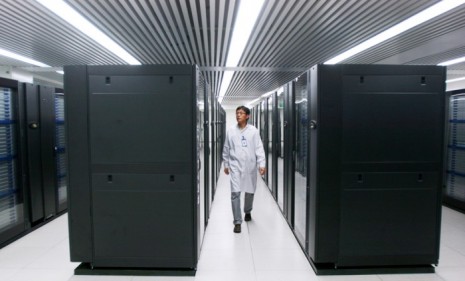How powerful is China's supercomputer?
Chinese researchers have developed a super-fast machine that blows away its American competition

A free daily email with the biggest news stories of the day – and the best features from TheWeek.com
You are now subscribed
Your newsletter sign-up was successful
As in so many other areas, China is surging ahead of the rest of the world in supercomputing. Last week, The New York Times reported that the National University of Defense Technology in Tianjin has developed a superfast machine, the Tianhe-1A, that easily outpaces the current, American leader — thus "giving China bragging rights as a technology superpower." Is this a portentous moment for the rest of the world, or mostly just hype?
Just how fast is China's new machine?
The National University of Defense Technology's supercomputer outdoes all its competitors, performing equations at a breathtakingly fast rate. The Tianhe-1A "can reach 2.5 petaflops," which is "a measure of calculating speed ordinarily translated into a thousand trillion operations per second." That's 1.4 times faster than the previous, record-holder, which is housed at Oak Ridge National Laboratory in Tennessee.
The Week
Escape your echo chamber. Get the facts behind the news, plus analysis from multiple perspectives.

Sign up for The Week's Free Newsletters
From our morning news briefing to a weekly Good News Newsletter, get the best of The Week delivered directly to your inbox.
From our morning news briefing to a weekly Good News Newsletter, get the best of The Week delivered directly to your inbox.
How did they build it?
"Modern supercomputers are built by combining thousands of small computer servers and using software to turn them into a single entity," says The Times. The Chinese accomplished this by using American-made chips from Intel and Nvidia, then building a high-speed "interconnect" system that enables data to flow back and forth between networks. The Chinese also strayed from the usual supercomputer formula by combining GMUs (graphics processing units) and CPUs (central processing units), which helps speed up computing.
What will it actually do?
Supercomputers like the Tianhe-1A can be used to solve complex mathematical equations and perform many other tasks, "including simulating commercial products like new drugs as well as defense-related applications such as weapons design and breaking codes."
A free daily email with the biggest news stories of the day – and the best features from TheWeek.com
Is this just a one-off stunt?
It seems unlikely. Unlike Japan, which created a stir (and helped stir U.S. development) by creating a supercomputer that briefly held the world's top spot in 2002, China seems devoted to making ever-faster machines. The developments in Tianjin are "part of a multi-year strategy by China to develop a range of machines to create a dominant position in both military and commercial applications."
So should the U.S. be worried?
Jack Dongarra, who helps oversee the supercomputer in Tennessee, says we should. "This is a wake-up call," he says. "We need to realize that other countries are capable of doing this. We're losing an advantage." But Boston University computer science professor Azer Bestavros questions "whether the emphasis on the 'fastest' supercomputer should be all that important," and wonders whether "the performance of a single machine is a bit misleading," especially because "we are increasingly moving towards more distributed forms of computing, including the use of grid and cloud computing infrastructures."
Sources: The New York Times, Wired, CNet, Forbes, Wall Street Journal, NPR
-
 Labor secretary’s husband barred amid assault probe
Labor secretary’s husband barred amid assault probeSpeed Read Shawn DeRemer, the husband of Labor Secretary Lori Chavez-DeRemer, has been accused of sexual assault
-
 Trump touts pledges at 1st Board of Peace meeting
Trump touts pledges at 1st Board of Peace meetingSpeed Read At the inaugural meeting, the president announced nine countries have agreed to pledge a combined $7 billion for a Gaza relief package
-
 Britain’s ex-Prince Andrew arrested over Epstein ties
Britain’s ex-Prince Andrew arrested over Epstein tiesSpeed Read The younger brother of King Charles III has not yet been charged